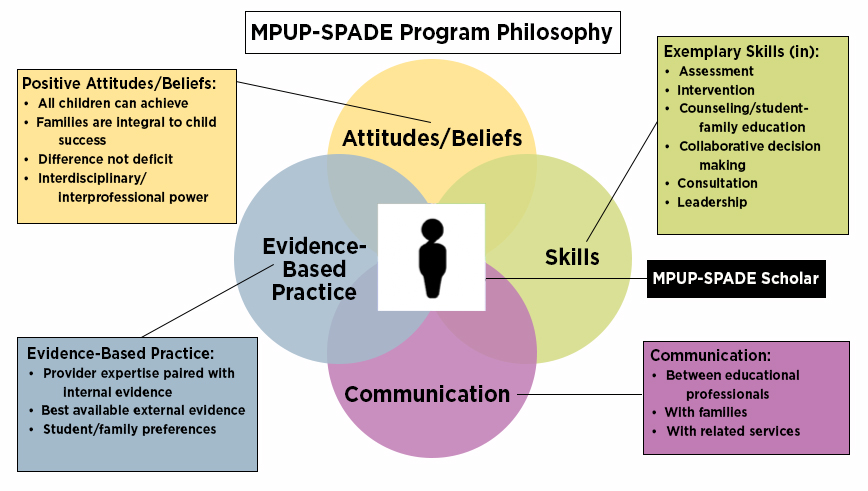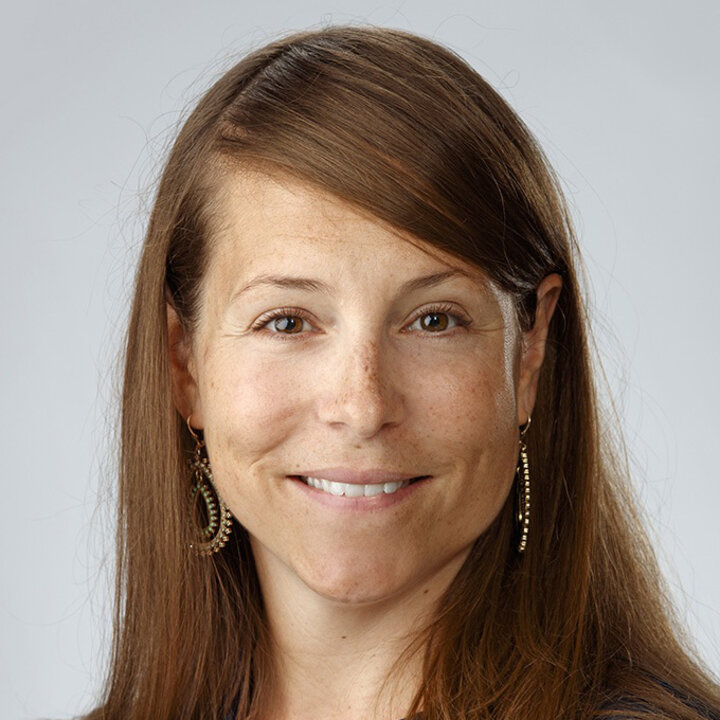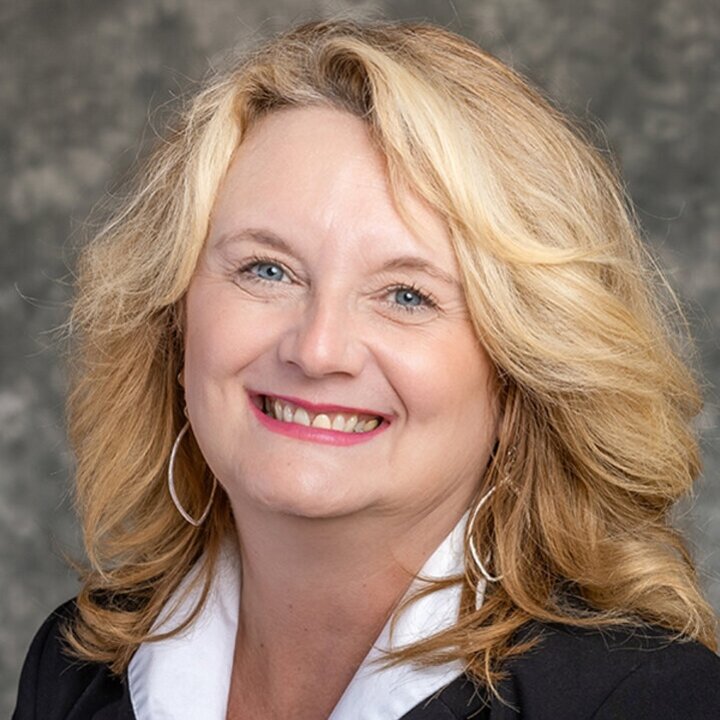Mid-Plains Professional Upgrade Partnership – Interdisciplinary Preparation in Speech-Language Pathology, Audiology, and Deaf Education (MPUP-SPADE)
The MPUP-SPADE project is designed to address the critical shortage of highly qualified practitioners who serve children and youth who are deaf or hard of hearing (DHH). The MPUP-SPADE project will provide specialized, interdisciplinary training to at least 30 scholars who are interested in pursuing either a master's degree in Speech-Language Pathology (SLP), a doctoral degree in Audiology (AUD), or a master's degree and teaching endorsement to become certified as a Teacher of the Deaf (TOD) at the University of Nebraska-Lincoln*. MPUP-SPADE scholars will work primarily as itinerant practitioners and consultants on professional teams, and thus, require strong collaborative and consultative skills. Through the MPUP-SPADE project, scholars in the SLP, AUD, and TOD programs will engage in a variety of collaborative and interprofessional learning activities focused on children who are deaf or hard of hearing with the goal of developing strong and effective interdisciplinary team-based skills that will positively impact the developmental, educational and postsecondary outcomes of children who are deaf or hard of hearing.
*Currently, UNL is the only university in the U.S. providing interdisciplinary training to scholars in these three programs.
MPUP-SPADE
The Importance of Interdisciplinary Training
Best practice indicates that services are most effective if provided within the context of team-based, interdisciplinary collaboration among qualified personnel who share a range of expertise (NASDSE, 2018). SLPs, AUDs, and TODs often work together in a variety of educational and clinical settings serving students who are deaf or hard of hearing, and therefore, must be prepared to effectively collaborate with one another and other team members to provide children who are deaf or hard of hearing access to quality language, learning and academic opportunities.

A History of Excellence
UNL's Speech-Language Pathology, Audiology, and Deaf Education programs have long histories of providing quality training over the years. In 2022, the U.S. News & World Report ranked UNL's Speech-Language Pathology master's program No. 20 out of 249 graduate programs in SLP and UNL's Audiology program No. 20 out of 76 graduate programs in Audiology. According to the 2019 The Best Colleges Survey, UNL ranks No. 17 in Online Master's Programs in Special Education, which includes the Deaf Education program, and No. 39 out of 392 schools in graduate education (U.S. News & World Report, 2019).
What does the MPUP-SPADE project cover?
Students who are accepted for funding under the MPUP-SPADE project will receive the following:
- Tuition assistance for 37-52* credits. (*Varies by program; students are responsible for all other credits/fees.)
- A personal copy of the American Psychological Association (APA) Manual – 7th Edition
- Travel expenses to the pre- and post- MPUP-SPADE Summer Seminars (in Lincoln, Nebraska)
- Coaching from a SLP, AUD, or TOD mentor
- Membership to a SLP, AUD, or TOD professional organization upon completion of the program
Program Curriculum
The MPUP-SPADE project has aligned all coursework, assignments, and practica experiences with each program's corresponding national field standards or competencies. For the TOD program, these are the CEC Initial Specialty Set for Deaf and Hard of Hearing (Revalidated 2018). For the SLP program, these are the ASHA Standards for the Certificate of Clinical Competence in Speech-Language Pathology (effective 2020 and 2023). For the AUD program, these are the ASHA Standards for the Certificate of Clinical Competence in Audiology (effective 2020 and 2023). Additionally, each program aligned the standards and assessments required for their individual state (Nebraska) certification endorsements with their corresponding field standards (CEC and ASHA) to ensure they reflect the same competencies. All scholars will be evaluated according to a modified version of the Interprofessional Education Collaborative (IPEC) Core Competencies for Interprofessional Collaborative Practice.
Please note: The MPUP-SPADE project is a rigorous and time-intensive program that includes additional requirements beyond those of our traditional TOD, SLP and AUD master's/endorsement programs. Additionally, as part of the service requirement for this grant, program graduates will need to be employed in a setting for at least 4 years where at least 50% of their time and caseload involves serving children/students, ages birth to 21, with disabilities. We recommend that you contact the program coordinator of the program you are interested in to talk through these additional requirements and ensure the program is the right fit for you before applying.
MPUP-SPADE Required Programs of Study and Shared Coursework
| AUD MASTER'S PROGRAM (IN-PERSON) | SLP MASTER'S PROGRAM (IN-PERSON) | TOD MASTER'S + ENDORSEMENT PROGRAM (ONLINE ONLY) | ||||
| Deficiency Coursework | Deficiency Coursework | Deficiency Coursework | ||||
| SPED 201: Intro into Exceptional Children | 3 | |||||
| N/A | Varies by student | SPED 212: SPED Assessment | 3 | |||
| SPED 414: Instructional Methods of Students with Math Disabilities | 3 | |||||
| SPED 454: Behavior Management | 3 | |||||
| ASL I-IV | 12 | |||||
| Pre-Sum | MPUP-SPADE Pre-Summer Seminar (on-campus; 3-day) | MPUP-SPADE Pre-Summer Seminar (on-campus; 3-day) | MPUP-SPADE Pre-Summer Seminar (on-campus; 3-day) | |||
| Fall 1 | SPED 872: Characteristics of DHH | 3 | SPED 872: Characteristics of DHH | 3 | SPED 872: Characteristics of DHH | 3 |
| SLPA 901: Aud Phys & Assess | 9 | SLPA 901: Aud Phys & Assess (mini-course) | 1 | SLPA 901: Aud Phys & Assess (mini-course) | 1 | |
| SLPA 897A: Clinic Practicum | 3 | SLPA 862: Cognition & Lang in Adults | 3 | SPED 860: Issues in Early Childhood SPED | 3 | |
| SLPA 874: Clinical Decision Making I | 2 | SPED 896D-Sec. 602: DHH Field Experience – Observations, Tutor/Group | 2 | |||
| SLPA 897B: On Campus Clinic | 1 | DHH Field Experience – Observations | ||||
| Spring 1 | SPED 896D-Sec 601: Professional Experiences – TOD-AUD-SLP Teaming | 1 | SPED 896D-Sec 601: Professional Experiences – TOD-AUD-SLP Teaming | 1 | SPED 896D-Sec 601: Professional Experiences – TOD-AUD-SLP Teaming | 1 |
| SLPA 903: Aud Percep & Amp | 9 | SLPA 967: Motor Aspects of Verbal Comm | 5 | SPED 873: Content Methods for DHH | 3 | |
| SLPA 897A: Clinic Practicum (w/Teaming) | 3 | SLPA 864: Language Disorders, age 5-21 | 4 | SPED 805: Systematic Review | 3 | |
| SLPA 897B: On-Campus Clinic (w/Teaming) | 1 | DHH Field Experience: Observations, Tutor/Group (w/Teaming) | ||||
| Summer 1 | SLPA 905: Intermediate Clinical Techniques | 3 | SLPA 905: Intermediate Clinical Techniques (mini-course) | 1 | SLPA 905: Intermediate Clinical Techniques (mini-course) | 1 |
| SLPA 897A: Clinic Practicum (w/Teaming) | 3 | SLPA 870: Evidence-Based Practices | 2 | SPED 876: Normal Language Development | 3 | |
| SPED 875: Clinical Decision Making & Counseling II | 2 | DHH Field Experience – Observations, Tutor/Group (w/Teaming) | ||||
| SLPA 897B: On-Campus Clinic (w/Teaming) | 1 | |||||
| Fall 2 | SLPA 907: Pediatrics & Electrophysiology | 8 | SLPA 907: Pediatrics & Electrophysiology (mini-course) | 1 | SLPA 907: Pediatrics & Electrophysiology (mini-course) | 1 |
| SLPA 998: Research Other Than Thesis (Capstone) | 1 | SLPA 886: AAC | 3 | SPED 874: Language Arts and Literacy for DHH | 4 | |
| SLPA 897A: Clinic Practicum (w/Teaming) | 3 | SLPA 982: Acquired Brain Injury (Adult elective) | 3 | DHH Field Experience: Observations, Tutor/Group (w/Teaming) | ||
| SLPA 966/966L: Swallowing Disorders and Lab | 3 | |||||
| SLPA 897C: On-Campus Clinic (w/Teaming) | 1 | |||||
| Spring 2 | SLPA 884: Speech & Language Development in DHH | 3 | SLPA 884: Speech & Language Development in DHH (Child Elective) | 3 | SLPA 884: Speech & Language Development in DHH | 3 |
| SLPA 909: Implants & Vestibular Assessment | 7 | SLPA 897G: Student Teaching | 3 | DHH Field Experience: Observations, Tutor/Group | ||
| SLPA 998: Research Other Than Thesis (Capstone) | 1 | |||||
| SLPA 897A: Clinic Practicum | 1 | |||||
| Summer 2 | MPUP-SPADE Post-Summer Seminar (on-campus; 2-day) | MPUP-SPADE Post-Summer Seminar (on-campus; 2-day) | MPUP-SPADE Post-Summer Seminar (on-campus; 2-day) | |||
| SLPA 911: Advanced Clinical Techniques | 3 | SLPA 897E: Medical Externship | 1 | SPED 875: Itinerant Teaching Methods | 3 | |
| SLPA 897A: Clinical Practicum | 3 | |||||
| AUD Master's Program Graduation | SLP Master's Program Graduation | TOD Master's Program Graduation | ||||
| Fall 3 | SPED 897: DHH Student Teaching | 3 | ||||
| TOD Endorsement Program Graduation | ||||||
| TOTAL AUD M.S. PROGRAM CREDITS | 62 | TOTAL SLP M.S. PROGRAM CREDITS | 45 | TOTAL M.ED. + ENDORSEMENT PROGRAM CREDITS | 34-58 | |
| TOTAL MPUP-SPADE SHARED COURSEWORK AND ACTIVITIES | 10 | TOTAL MPUP-SPADE SHARED COURSEWORK AND ACTIVITIES | 10 | TOTAL MPUP-SPADE SHARED COURSEWORK AND ACTIVITIES | 10 | |
| TOTAL AUD CREDITS COVERED BY MPUP-SPADE | 52 | TOTAL SLP CREDITS COVERED BY MPUP-SPADE | 38 | TOTAL TOD CREDITS COVERED BY MPUP-SPADE | 40 | |
Notes: Italicized text indicates required activities students will be completing at that time. Total credits in TOD program may vary depending on the number of equivalent deficiency and/or content courses a student enters the program with.
Field Experiences and Student Teaching Requirements for TOD Endorsement
All students pursuing the graduate endorsement to become a Teacher of the Deaf (TOD) are required to complete a variety of field experiences with students who are DHH across a range of age levels and settings prior to beginning their student teaching. Student teaching must be completed with a minimum of three DHH students at different age/grade levels and be supervised by an 'on the ground' Teacher of the Deaf. Both field experiences and student teaching require direct access to students who are DHH.
Sign Language Proficiency Requirement
All students enrolled in TOD program must complete one of the following in order to be approved for student teaching: 1) Earn a grade of B or better in at least four college-level courses* of ASL (or equivalent) AND show evidence of conversational use of ASL, OR 2) Earn a rating of "Intermediate" proficiency or higher on the sign language proficiency interview (SLPI) or another nationally/regionally approved sign language assessment. Students must email a copy of their ASL course transcripts and evidence of conversational ASL skills OR SLPI evaluation results to Dr. Thomas the semester prior to student teaching in order to receive approval for student teaching. (*Must be taken within the past 5 years.) Information about the sign language proficiency evaluation can be found here. A list of resources for developing ASL skills can be found here.
Who Should Apply?
Students who are interested in pursuing a Master's degree and teaching endorsement in Deaf Education, a Master's degree in Speech-Language Pathology, or a Doctoral degree in Audiology and who would like to receive specialized, interdisciplinary training focused on improving the developmental, educational and post-secondary outcomes of children and youth who are deaf or hard of hearing.
*Please Note: Students interested in pursuing the teaching endorsement and Master's degree in Deaf Education must hold a current and valid teaching certificate in their state in a specified content area (e.g., special education, elementary education, secondary English) or a speech-language pathology school clinical certificate. Students interested in pursuing a Master's degree in Speech-Language Pathology or a Doctor of Audiology degree must hold an undergraduate degree in Communicative Disorders or have completed pre-requisite coursework. All applicants must be accepted to the corresponding degree program at UNL in order to qualify for funding. To be accepted to MPUP-SPADE, applicants must have a minimum 3.0 GPA. Please visit the Speech-Language Pathology, Audiology, and Deaf Education program webpages for more information about these individual programs.
How do I apply for the MPUP-SPADE project?
There are two steps to apply to the MPUP-SPADE project: 1) Apply to the respective Master's or Doctoral program you are interested in (see official program titles below), 2) Once admitted to your respective program, you will be invited (via email) to apply for the MPUP-SPADE funding by providing a written statement of why you are interested in receiving specialized interdisciplinary training in working with students who are deaf or hard of hearing.
Program Selection Titles:
- SLP Master's program: Speech-Language Pathology and Audiology (MS)
- AUD Master's/Doctoral program: Audiology and Hearing Sciences (AuD) and Speech-Language Pathology and Audiology (MS)
- Deaf Education Master's program: Special Education (M.Ed.) – Education of the Deaf and Hard of Hearing
As part of your application, you will be asked to submit the following:
- Transcripts from all colleges/universities attended
- TOEFL scores (International students only) (Institution code = 6877; Department code = 77)
- Financial Resource Certification (International students only)
- Resume/vita
- Statement of purpose/goals – Deaf Education majors must address the following: 1) Why do you want to pursue a Master's degree and what skillset do you want to acquire that you wouldn't otherwise have without this degree? 2) What challenges do you anticipate experiencing in graduate school (e.g., balancing work and/or family, time management), and what strategies will you use to overcome the challenges? 3) How do you monitor learning, at what stage do you determine you need to alter your approach to studying, and what would those changes entail? *Your answers will also be judged based on the quality of your writing.*
- Prerequisite courses
- Names and contact information for three references of your choosing. (The system will automatically email the specified people and request that each complete the recommendation and upload a letter of reference.)
- Assistantship / Fellowship application – Optional; To be considered for an assistantship, 1) check the appropriate boxes in the Funding section of the Additional Information page and 2) complete the Graduate Assistantship Application.
- Writing sample – Optional; Provide a writing sample that demonstrates your scholarly writing ability, for example a term paper, thesis or published article.
Application Deadline for MPUP-SPADE Project
January 15
Want more information about the MPUP-SPADE project? Contact us!

